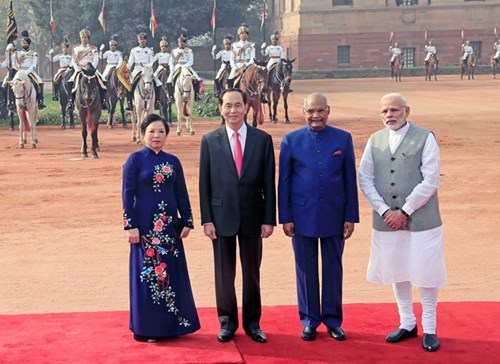At the ceremony, the Vietnamese leader, his wife and the Vietnamese delegation were welcomed by Indian President Ram Nath Kovind, Prime Minister Narendra Modi, and many senior officials of India.
    |
 |
|
President Tran Dai Quang and his spouse are welcomed by Indian President Ram Nath Kovind (second, right) and Prime Minister Narendra Modiat (first, right) at the official welcome ceremony in New Delhi on March 3 |
After the welcoming ceremony, President Quang gave an interview to Indian media, highlighting the importance of his State visit to India from March 2 to 4 and the prospects of the two countries’ comprehensive strategic partnership in the future.
Later, the President had talks with Narendra Modi at the Indian PM’s Office in New Delhi.
Following the talks, President Quang and PM Modi witnessed the exchange of cooperation documents signed during this visit, namely a memorandum of understanding (MoU) on cooperation between the Vietnam Atomic Energy Institute and the Global Centre for Nuclear Energy Partnership, an MoU on cooperation in economy and trade between the Vietnamese Ministry of Industry and Trade and the Indian Ministry of Commerce and Industry, and an action plan on agricultural cooperation for 2018-2020.
After that, the two leaders chaired a joint press conference to announce the outcomes of their talks.
PM Modi affirmed that the State visit by President Quang reflects Vietnam’s commitments to bolstering the countries’ comprehensive strategic partnership. He stressed bilateral ties date back thousands of years ago and today’s generations are benefiting from the relationship set up by late PM Jawaharlal Nehru and President Ho Chi Minh.
The Indian PM informed that during his talks with the Vietnamese President, the two sides discussed in-depth all aspects of the two countries’ comprehensive strategic partnership with strong growth recorded in bilateral trade.
According to India’s statistics, two-way trade increased to over 10 billion USD from 6 billion USD over the past 5 years.
Vietnam and India agreed to focus on renewable energy, agriculture, garment-textile, oil and gas. Particularly in the field of oil and gas, along with the current cooperation mechanism, India hopes to expand tripartite collaboration between Vietnam, India and the third party.
Another important pillar in the bilateral cooperation is defense-security. India is keen to partner with Vietnam in this sphere to ensure an independent and stable Indo-Pacific region with differences to be addressed peacefully.
President Tran Dai Quang said the two countries reiterated commitments and high political determination to further deepen Vietnam-India relations as well as exchanged major orientations to enhance cooperation across the board.
Regarding politics and diplomacy, Vietnam and India agreed to increase all-level delegation exchanges, especially among high-ranking officials, via the Party, State, Government, and National Assembly channels in addition to tightening people-to-people exchanges.
The President invited his Indian counterpart Ram Nath Kovind, PM Narendra Modi and Indian top legislators along with leaders of Indian Parties and States to visit Vietnam soon.
The two sides will push ahead with cooperation in defense-security through maintaining English training courses and building capacity for the two sides’ officials, providing preferential credit packages, joining the UN peacekeeping activities, improving the efficiency of defense-security dialogues and mechanisms, and considering the expansion of cooperation in other potential fields.
Regarding economic-trade-investment cooperation, trade barriers will be reduced, making it easier for exports of the two countries to access each other’s market, towards lifting the bilateral trade to 15 billion USD by 2020.
The two sides highly valued symbolic cooperation projects such as Long Phu 2 thermal power plant in the Mekong Delta province of Soc Trang, wind and solar power projects in central south provinces, and talked the possibilities of setting up garment and textile industrial parks of India in Vietnam.
Vietnam hopes India will continue to provide Vietnam with technical, technological and financial assistance in the breakthrough fields of infrastructure and human resources development, and science-technique; and help Vietnam improve its research and development capability, especially in bio-technology, health care, and application science, President Quang said.
The two countries will also work closely in an India-funded project to preserve and embellish the My Son relic site, as well as launching more tourism promotion activities, thus increasing the number of visitors to the respective country.
On the multilateral level, President Quang affirmed Vietnam will cooperate closely with India to help the Central Asian country further bolster all-around ties with other ASEAN member nations, for the sake of both sides.
He also highlighted the importance of maintaining security, safety, aviation and navigation freedom; resolving disputes by peaceful measures in line with international law, including the 1982 United Nations Convention on the Law of the Sea (UNCLOS), and strictly respecting diplomatic and legal processes.
Also on March 3, President Tran Dai Quang, his spouse and entourage paid floral tribute to India's national hero Mahatma Gandhi at the Raj Ghat Memorial.
Source: VNA